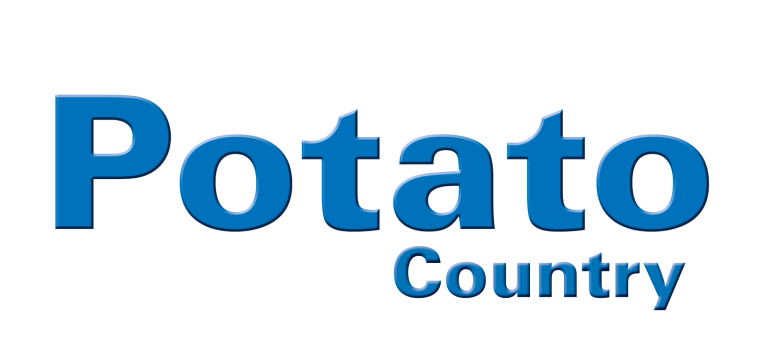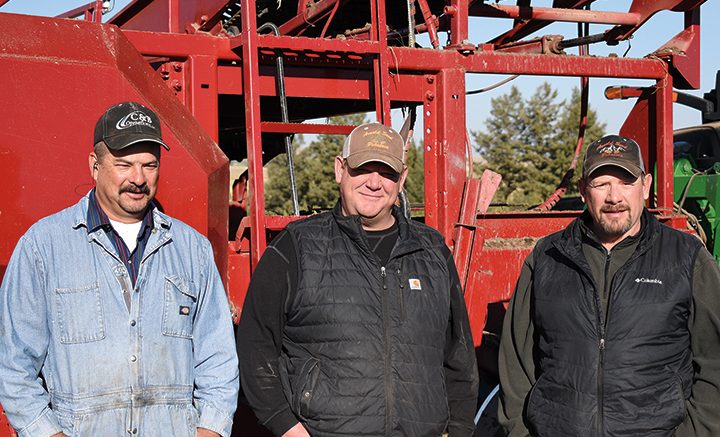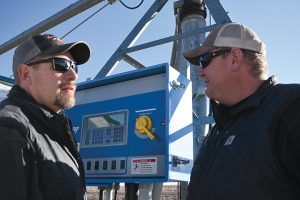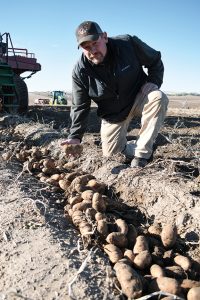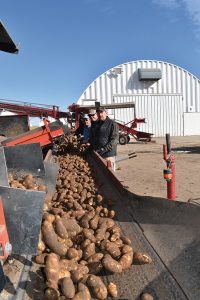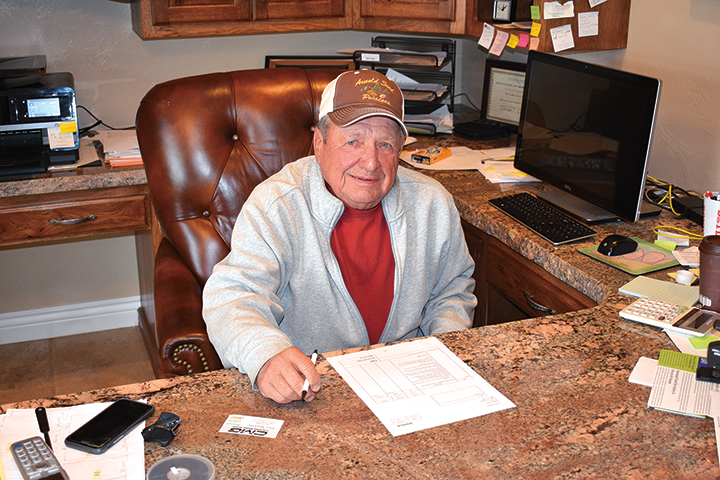Story and photos by Dave Alexander, Publisher
Scenic Teton Valley, Idaho, is perhaps best known for its fly fishing, promoting itself as one of the finest dry fly fisheries in the United States. Boasting a vigorous population of native cutthroat trout, “the Valley,” as locals call it, sees many tourists in the summer who want to play on the quiet side of the Teton Mountains. Felt is an unincorporated community in the area. It is without a traffic light, without a store and without a post office. What Felt does have, though, is a successful seed potato grower with deep roots in the Valley and the potato industry.
Valley Roots
Dennie Arnold and his sons, Eric and Jeremy, with Arnold Farms are third- and fourth-generation seed potato growers in Felt, Idaho. Arnold Farms’ roots were planted in Teton Valley in 1918, when the fishing must have been nothing short of spectacular. Dennie’s grandfather and his family were raising sheep when they realized that they were on good, deep soil. They became some of the first farmers in Felt. With 480 acres, they grew barley and wheat without irrigation. Dennie’s grandfather, having lived through the Great Depression, wanted nothing to do with taking on the debt to drill a well, so they remained a dry farm.
Dennie’s dad took the financial leap and drilled the first well in Teton County in 1967. From there, Dennie and his brother Bruce grew potato seed until 1982 when the brothers split into two farms, opening the door for Jeremy and Eric to join Dennie’s operation.
Industry Advocate
Dennie has served on various potato boards and councils since the 1970s. Potatoes USA, National Potato Council (NPC), United Seed Potato Growers of Idaho, Potato Growers of Idaho and Idaho Potato Commission have all benefitted from Dennie’s knowledge and experience growing seed potatoes.
Always an innovator, Dennie won the NPC Environmental Stewardship Award in 2001. Though aerial spraying was the norm, the grower switched to a field sprayer to help protect the sensitive rivers in the Teton Valley.
Dennie and his wife, Janet, have traveled so much in the winter over the years to potato meetings that she is looking forward to a time when they can go on a vacation and pick a destination that has nothing to do with potatoes. But Dennie doesn’t have much time for vacations or casting flies in the nearby Teton River. He is still active on the farm every day, though his sons now do most of the heavy lifting.
One Big Family
A typical day for Dennie involves overseeing the farm’s finances, paying bills or running errands. Along with general farm operations, Eric handles chemical and fertilizer acquisition and application, and Jeremy takes care of shipping and keeps parts flowing in the shop.
Farm manager, Chuy Olivas, started with the Arnolds when he was 13 years old. Now in his 50s, Olivas manages the staff, including Sam Villa who has also been at Arnold Farms for decades.
“This whole deal is like one big family. The employees treat this farm like it’s their own,” Dennie says.
He is appreciative that he can come and go as he needs to most of the time because of his sons and excellent staff. The family has 6,000 total acres and grows barley, spring wheat, winter wheat and hay, in addition to seed potatoes.
Clean, High-Performing Seed
The farm’s 1,300 acres of seed potatoes benefit from the Valley’s high altitude of 6,100 feet, according to Eric, but rigorous sanitation methods account for its clean, high-quality, disease-free seed. Jeremy says they spend a lot of time disinfecting sheds and equipment – two to three times a year, plus in between lots. They take pride in their high industry standards. The sheds are inspected by the Idaho Crop Improvement Association for cleanliness. Potatoes are grown three to four years in rotation, keeping a check on volunteers.
Seed is flushed out every year, and the Arnolds go to great lengths and expense to ensure they start with the highest quality seed. They plant Generation I and II seed from Montana, North Dakota and Nebraska and sell it as Generation III seed.
Isolation also plays a part in producing clean seed. The Arnold fields are accessed by roads only locals know, and it snows up to five feet per year with drifts 10 feet deep.
Varieties include Russet Burbank, Ranger Russet, Clearwater Russet, Teton Russet and a variety of Russet Norkotahs. Fred Dormaier with Teton Seed Marketing Association markets some of the Arnolds’ seed. Their own customer base covers Washington, Oregon and Idaho.
Rolling Along
If you are going to farm or fish in Teton Valley, you have to be prepared to adapt to the weather or try a different fly. The Arnolds have had to start and stop harvest several times this year because it’s been unusually rainy. The crop looks good, however, and “it will get done sooner or later,” Dennie says casually.
Though Janet looks forward to Dennie’s retirement and choosing her own vacations, Dennie doesn’t plan on retiring anytime soon. He said he really wouldn’t know what to do with all the free time. He has given up on fly fishing, but does admit to a penchant for golfing with friends and family.
If you are looking for a place to cast a fly or are fishing around for potato seed, consider Teton Valley and drop a line to Arnold Farms at the base of the beautiful Grand Teton Mountains.
